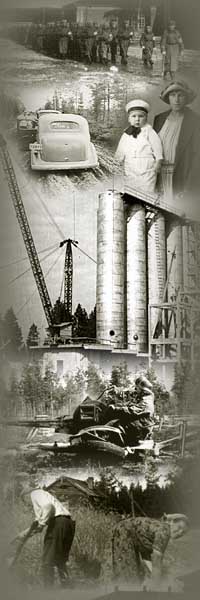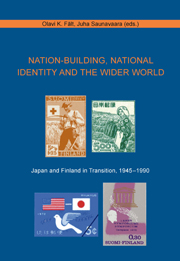 |
 |
|
|
Studia
Historica Septentrionalia
60 |
|
|
Olavi K. Fält and Juha Saunavaara (eds.),
Nation-Building, National Identity and the Wider World – Japan and Finland in Transition, 1945 – 1990.
The Historical Association of
Northern Finland. Pohjois-Suomen Historiallinen Yhdistys,
Rovaniemi 2010. Black-and-white illustration.
|
 |
The Faculty of Humanities, University of Oulu, organized a multidisciplinary international conference “Japan and Finland in Transition, 1945 – 1990” on August 27 – 28, 2009. The aim of the conference was to address Japan and Finland from the point of view of similarities and dissimilarities in their development after World War II. Namely, both Japan and Finland were defeated by the Allies and subjected to foreign control, in Japan’s case actual occupation, in 1945–1952. During these years reconstruction was the dominating phenomenon in both countries. In the following decades they experienced huge economic development that evolved hand in hand with rapid urbanization, industrialization, democratization and expansion of the education system, student radicalism, changes in the gender system, stability in domestic politics from the 1950s to 1980s, and finally, the foreign policy.
Eventually the similar aspects of Japan and Finland formed only one of the main themes that came up in the presentations, which are now – after revision and rewriting – being published. As the majority of the presentations dealt with nation-building and national identity in postwar Japan, this publication also concentrates mainly on Japan. However, even the articles that do not contain a direct comparative element challenge the reader to evaluate Japan’s history in an international context.
All in all the articles indicate that the occupation period established the basis for the future of Japan, and thereafter contradictions between the national culture and globalization formed constant challenges for the society. The comparisons between Japan and Finland show that the transition process was going on almost simultaneously, but not similarly, in both societies.
Table of Contents:
The Occupation Period and Postwar Society
Juha Saunavaara, Under Pressure – External Influence on Domestic
Politics in Early Postwar Japan
Yoneyuki Sugita, Japanese Health Insurance Systems During the Allied Occupation from an International Affairs Perspective
Jari Okkonen, The US Occupation Authorities and the Toro Excavation – Remarks on Early Post-War Archaeology in Japan
Japan and Globalization
Olavi K. Fält, Globalization and national identity in Japan from 1945 to 1989
Alexander Bon, Globalization and national identity in Japan from 1945 to 1989
Postwar Japan and Finland in Comparison
Henry Oinas-Kukkonen, High Variability in the US Estimates of the Immediate Post-World War II Political Transition in Finland and Japan
Tuula Okkonen, Learning from modern to postmodern – Education
and social transition in Japan and Finland
Kari Alenius, Harmony, History and Grand Accomplishments. The
Images of Social Change Portrayed in Finnish and Japanese Postage
Stamps (1945 – 1990)
|
 |